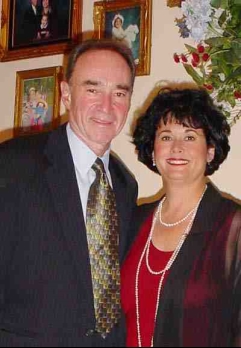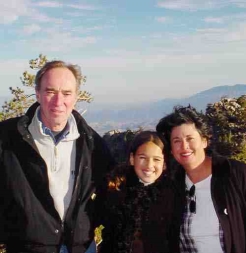Matrix of Care: Mesothelioma as a Family Illness
A four-part series with Linda Reinstein, Executive Director of the Asbestos Disease Awareness Organization (ADAO). ADAO a registered nonprofit volunteer organization, united for united for asbestos disease awareness, education, advocacy, prevention, support and a cure. ADAO does not make legal or medical referrals.
When Linda Reinstein's husband Alan experienced lethargy, weight loss, and shortness of breath, he faced a common problem: in consultation after consultation the robust former marathoner came across as "too healthy to be sick." One year of undiagnosed symptoms and checkups by specialists throughout Los Angeles couldn't pinpoint the problem. In the end, a thoracoscopy gave it away. Alan had malignant pleural mesothelioma.
 |
| Alan and Linda |
"Mesothelioma is a family illness," says Linda. "Yes, the tumor invades one person, but it's impact is felt by many. Mesothelioma, I've learned, spawns an incredibly complex matrix of issues, all of which have to be understood, organized, and worked through if you're to even have a fighting chance, starting with the diagnosis. My God, he was so healthy-how could we ever have known he had this terrible cancer?"
The matrix of care, as Linda calls it, pulls together unrelated elements relating to treatment and care that ultimately become intimately connected. Managing that matrix is more important than the treatment itself, because the treatment will only succeed if the other components are effectively handled.
"Think about it," she says. "80% of thoracenteses are false negatives for mesothelioma. So every time Alan had fluid drained and they checked the cytology, it was negative, so we heaved a sigh of relief. Who wants to know they have cancer? We didn't put up a fight, who would? But it turns out the time we spent 'celebrating' we could've been treating the cancer, had we known it was in there gathering strength."
The diagnostic shock
"There's nothing you can do to manage a disease you don't know you have," Linda says. "It took nine months of false negative thoracenteses, false negative bronchoscopies, and useless prescriptions of cortisone before we found out. The doctor gave us a choice between more cortisone and a thoracoscopy. 'No more false bridges to nowhere,' I told him. 'The cortisone's meaningless and only temporality reduces this symptoms. Give us the thoracoscopy.'"
The surgeon later took Linda aside and told her that Alan had mesothelioma, a cancer that was incurable but treatable. "What in the world did that mean?" Linda says. "If it's treatable, you're good, right? I actually left the hospital feeling optimistic, and like everyone else who gets sick nowadays, I went home and Googled. I was stunned. This is a terminal disease. No hope. Give up. And I had to tell this to Alan? You can't imagine, no one who's not been through it, can imagine. It's your worst nightmare, only you're wide awake."
Putting together the pieces
"In retrospect, I wish I'd had a manual. A how-to guide. A roadmap from someone who'd been down this path, someone who could tell me in an evening's read what I was in for, how to plan, what to expect. Instead I spent three years living that roadmap. Now, I've been farther down that road than most, and I think that everyone with mesothelioma has to grapple with some or all of these issues.
"The way these issues interplay is a matrix. They can be written down, predicted to some degree, and even scripted, depending on the situation. Having some control over this matrix, even though as a whole it's uncontrollable, makes the difference between life and death, between mental health and just coming unglued." Linda smiles with compassion. She knows what she's talking about. She's lived it.
The four major components that most mesothelioma families face are medical treatment, family care giving, emotional health, and legal issues. Ways exist to track and anticipate changes in each of these areas, and Linda's experience shows how to do it.
Medical treatment
"I was pre-med in college, so Alan asked me to communicate directly with his medical team. He didn't want to know the details. But medical treatment is so much more than getting operated on, taking medicine, and going to appointments. The patient and spouse have to collaborate. This doesn't mean they do the same things, or that their activities are redundant. But there has to be synergy. It can't all be left up to the care giving spouse."
Medical treatment includes managing the treatment once it has been prescribed, having what Linda calls "stop-loss exit strategies," and perhaps most importantly, nutrition. "The biggest gun in your arsenal is an Excel spreadsheet. If computers make you break out in hives, then it's a whiteboard. Even a notebook will do. The core tool behind managing mesothelioma-or any cancer-is record keeping. Pencil and paper. What did you do? When did you do it? What was the result? What is the next step? Most importantly, always request a copy of your test results. You can get very comfortably in front of the fast-breaking wave just by keeping track of these five aspects of medical treatment.
 |
| Reinstein Family |
"It will keep you and your doctor informed. Why? Because in my experience, clinical symptoms are many times more revealing than diagnostic evaluations. A well-kept ledger that tracks symptoms and conditions will drive the office evaluation and will inform the diagnosis. At so many points in the illness, it's less important to know that you have mesothelioma than it is to know, for example, that you have a staph infection. Doctors and nurses are extremely busy caring for many patients. You're the one who will have to deal with the vomiting, nausea, loss of appetite, hypertension, whatever. And your record keeping will allow you to participate in your treatment and future treatment decisions.
"It's all about managing the risks versus rewards.. Every treatment has an anti-treatment. The pharma industry calls them side effects, but there's nothing lateral about them. They almost always work directly against what you're trying to accomplish. Will the anti-treatment of a given procedure or chemo cocktail outweigh the treatment?"
The same thing is true for having an exit strategy, she says. "The minute you get an instruction about what to do, start formulating a contingency for when things don't go as planned. Medicine is about applying exceptions-your particular life-to proven generalities for other people's lives. So what if it worked on Carol? If it's killing my Alan, it's up to me to cut my losses with a particular regimen and try something else. Get in the habit of thinking about and writing down your stop-loss plans. Think like a general. If they turn our flank, what are our avenues for retreat? What are our options for renewing the assault? That's cancer. Advance, feint, retreat, attack, and above all, live to fight another day."
The simplest things ultimately have the greatest sway. "Remember what your good Jewish grandmother used to say? Eat! She knew what she was talking about. If you want to beat cancer, you have to eat. It takes 3500 calories to gain a pound. That's a huge issue for someone in the throes of chemo, no appetite, nauseated, down forty pounds, everything smells bad and tastes worse. How do you to get your loved one to consume 3500 calories? No magic, you know a weakened immune system will impact recovery and maintenance. Back to your white board and make revised the patient's nutritional plan.
Coming: Part II: Caring for the Care Givers

